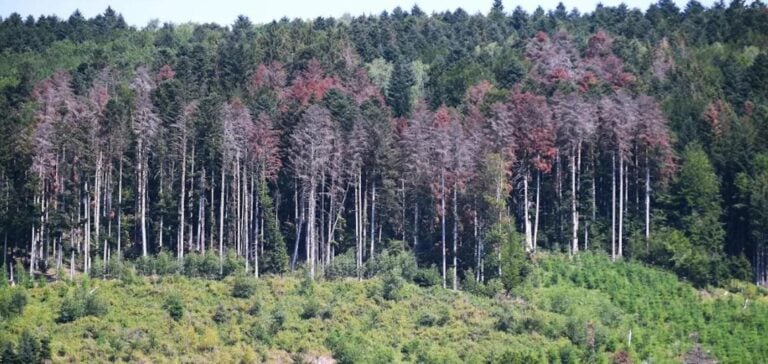France has failed to meet its carbon budget for the period 2019-2023, according to the final figures announced by the Citepa organization. Greenhouse gas emissions have fallen in almost all sectors of the economy, but forests and soils, which are supposed to absorb part of these emissions, have not fulfilled their role as expected. Average emissions were 380 million tonnes (Mt) of CO2 equivalent, compared with a target of 379 Mt, an overshoot of 1.4 Mt.
Insufficient decarbonization efforts
Greenhouse gas emissions in France will be 5.8% lower in 2023 than in 2022. This reduction has affected almost all sectors, including agriculture, transport and industry. However, these efforts have not been enough to achieve the climate targets set by the SNBC (National Low Carbon Strategy). CO2 sequestration performance by biomass and soils was well below expectations, affected by various environmental and human factors.
Carbon sinks in trouble
Trees naturally store CO2 in their branches and roots through photosynthesis, but these carbon sinks have shown disappointing performance in recent years. The 2019-2023 strategy forecast a carbon sink of -40 to -45 Mt by 2030, but the volumes stored have recently been around -20 Mt CO2. Reasons include repeated droughts since 2015, diseases increasing tree mortality, and increased timber harvests.
Implications for climate policy
This reduction in the carbon sink requires additional efforts in other sectors to achieve carbon neutrality. Sylvain Angerand of the Canopée association criticizes the government for its insistence on increasing timber harvesting despite warning signs about forest health. He points out that tree mortality and reduced growth due to drought are difficult phenomena to influence, but that forest management policy remains a choice that can be modified.
Perspectives and reflections
To achieve its climate objectives, France will not only have to step up its decarbonization efforts in all sectors, but also rethink its forest and land management. The performance of carbon sinks is crucial to offset remaining emissions, and an integrated strategy that takes into account the impacts of climate change on forest ecosystems is essential. The road to carbon neutrality requires greater coordination between environmental, agricultural and industrial policies.
France faces a major challenge: to step up its carbon sequestration efforts while continuing to reduce greenhouse gas emissions. Lessons learned from the 2019-2023 period should guide future strategies to ensure that national climate targets are met in a sustainable and resilient way.






















